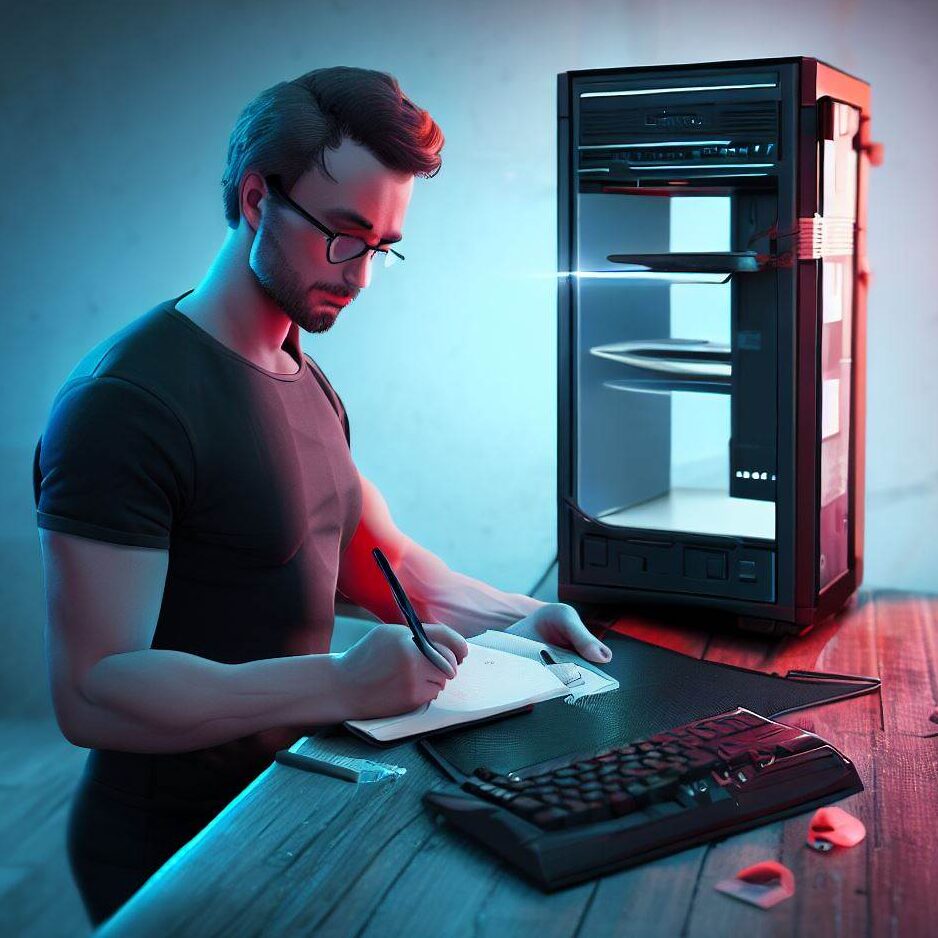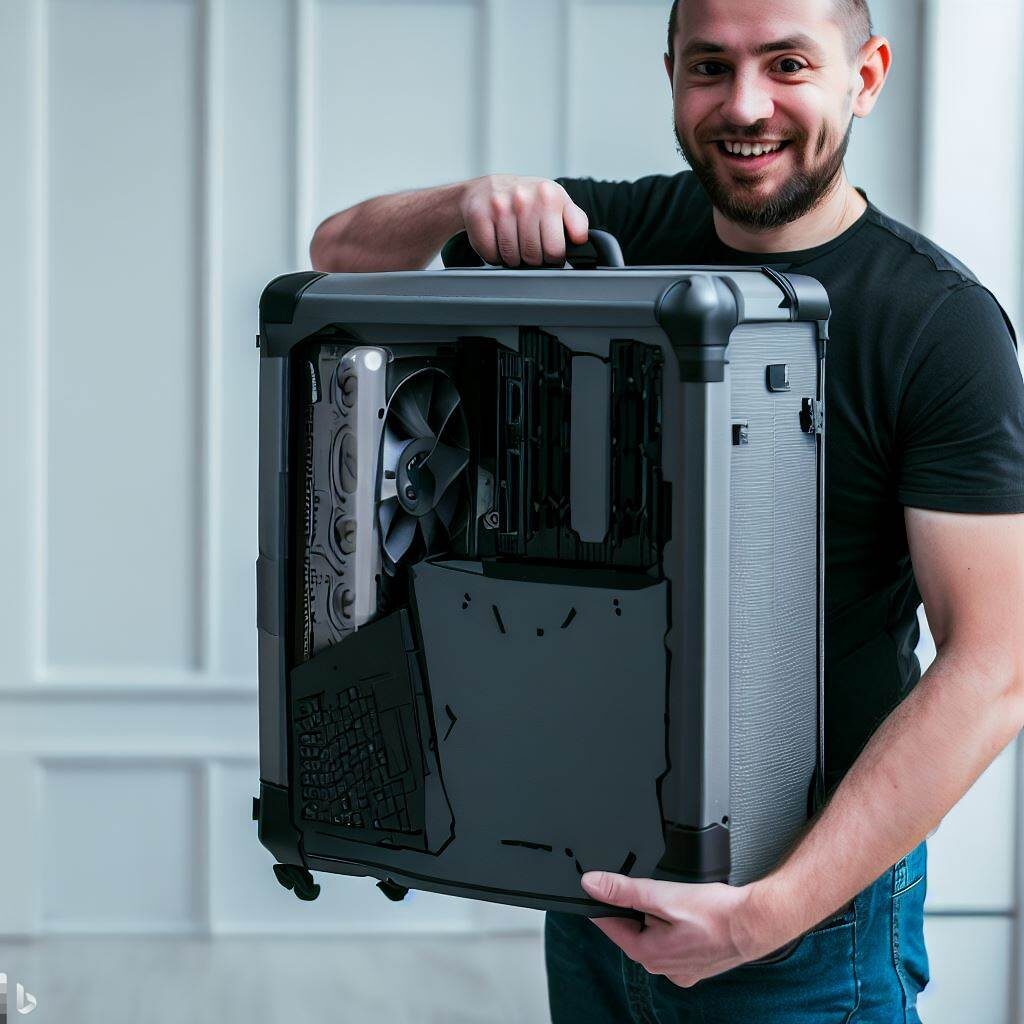If you are a gamer, you probably know how important it is to have a powerful gaming PC that can run your favorite games smoothly and flawlessly. But have you ever wondered how much your gaming PC weighs? And why does it matter?
The weight of a gaming PC is not something that most gamers think about, but it can have a significant impact on your gaming experience and convenience. Depending on the size, shape, and components of your gaming PC, it can weigh anywhere from a few pounds to several dozens of pounds. And that can make a big difference when you need to move it around, upgrade it, or clean it.
Table of Contents
In this blog post, we will reveal 5 surprising facts about the weight of gaming PCs that you need to know. Whether you are looking for a new gaming PC or want to learn more about your current one, these facts will help you understand the pros and cons of different weight options and how to choose the best one for your needs.
How much does a gaming PC weigh on average?
The average weight of a gaming PC depends on several factors, such as the type of case, the number and size of components, the cooling system, and the accessories. Generally speaking, gaming PCs tend to be heavier than regular PCs because they have more powerful and larger components that require more space and cooling.

According to PC Gamer, the average weight of a gaming PC is around 20 pounds (9 kg). However, this can vary widely depending on the specific model and configuration. For example, some mini gaming PCs can weigh as little as 5 pounds (2.3 kg), while some full tower gaming PCs can weigh as much as 50 pounds (22.7 kg) or more.
Factors that can affect the weight of a gaming PC
Case
The case is the outer shell that houses all the components of your gaming PC. The case can vary in size, shape, material, and design. Generally, larger cases are heavier than smaller ones because they have more space for components and cooling. However, some cases are made of lighter materials such as aluminum or plastic to reduce weight. Some cases also have handles or wheels to make transportation easier.
Components
The components are the parts that make up your gaming PC, such as the CPU, GPU, motherboard, RAM, storage, etc. The components can vary in size, performance, and power consumption. Generally, more powerful and larger components are heavier than less powerful and smaller ones because they have more circuitry and cooling. However, some components are designed to be compact and lightweight to save space and energy.
Cooling system
The cooling system is the part that keeps your gaming PC from overheating by dissipating heat from the components. The cooling system can consist of fans, heatsinks, liquid cooling loops, radiators, etc. The cooling system can vary in size, efficiency, and noise level. Generally, more efficient and quieter cooling systems are heavier than less efficient and louder ones because they have more fans and liquid.
Accessories
The accessories are the parts that enhance your gaming PC’s functionality or aesthetics, such as RGB lighting strips, sound cards, optical drives, etc. The accessories can vary in size and weight.
Comparisons of the Extremes
In this section, we will compare the weights of the two extreme weight classes of Gaming PCs. The reason for this comparison is to give you an idea of where your gaming PC’s weight should be.
Smallest Gaming PC on the Market
The Intel NUC 9 Extreme Kit Ghost Canyon is a great option for gamers who value portability and performance. However, it also has some drawbacks. It is very expensive, costing around $1,700 for the barebones kit without RAM, storage, or OS. It also has limited upgradeability, as you can only swap out the GPU and the SSDs. It also runs hot and loud under load, and may not be able to handle the most demanding games at the highest settings.
Heaviest gaming PC on the market
If you are looking for a gaming PC that can handle any game without breaking a sweat, you might want to consider the heaviest gaming PC on the market. According to PCMag, the heaviest gaming PC available right now is the Origin PC Big O. This monstrous gaming PC weighs a whopping 69 pounds (31.3 kg) and measures 24 x 21 x 9 inches (61 x 53.3 x 22.9 cm).
The Origin PC Big O is not just a gaming PC; it is also a gaming console. It combines a custom-built gaming PC with either a PlayStation 5 or an Xbox Series X inside a single case. You can switch between the PC and the console with a simple press of a button, and enjoy both platforms on the same monitor or TV. The Origin PC Big O also has a liquid cooling system for both the PC and the console components, and RGB lighting for extra flair.
The Origin PC Big O is a dream machine for gamers who want to have it all. However, it also has some drawbacks. It is extremely expensive, costing around $7,000 for the base configuration with a PS5 or an Xbox Series X. It also has limited availability, as you have to provide your own console or wait for Origin PC to source one for you. It also takes up a lot of space and power, and may not be easy to move or maintain.
Why does the weight of a gaming PC matter?
You might be wondering why you should care about the weight of your gaming PC. After all, it is not like you are going to carry it around all the time, right? Well, not necessarily. The weight of your gaming PC can have some advantages and disadvantages depending on your situation and preferences.
Benefits of Having a Lightweight Gaming PC
- Portability: A lightweight gaming PC is easier to transport from one place to another, whether you are moving to a new home, going to a LAN party, or traveling with your rig. You can also fit it in smaller spaces and use it in different environments.
- Upgradeability: A lightweight gaming PC usually has fewer components and more space inside the case, which makes it easier to access and replace parts when you want to upgrade your system. You can also add more components without worrying about exceeding the weight limit of your case or PSU.
- Efficiency: A lightweight gaming PC usually consumes less power and generates less heat than a heavyweight gaming PC, which means it can run more quietly and save energy. You can also use a smaller PSU and cooling system, which can reduce costs and noise.
Drawbacks of Having a Lightweight Gaming PC
- Performance: A lightweight gaming PC usually has less powerful components than a heavyweight gaming PC, which means it may not be able to run some games at high settings or resolutions. You may also experience lower frame rates, stuttering, or crashes in some games.
- Durability: A lightweight gaming PC usually has less sturdy components than a heavyweight gaming PC, which means it may be more prone to damage from shocks, vibrations, dust, etc. You may also have to compromise on some features or quality to reduce weight.
- Aesthetics: A lightweight gaming PC usually has less flashy components than a heavyweight gaming PC, which means it may look less impressive or attractive to some gamers. You may also have fewer options for customization or personalization.
Benefits of having a heavyweight gaming PC
- Performance: A heavyweight gaming PC usually has more powerful components than a lightweight gaming PC.
- Durability: Heavier Gaming PCs are better when it comes to
Some of the drawbacks of having a heavyweight gaming PC
- Portability: A heavyweight gaming PC is harder to transport from one place to another, whether you are moving to a new home, going to a LAN party, or traveling with your rig. You may also need more space and support to accommodate it in different environments.
- Upgradeability: A heavyweight gaming PC usually has more components and less space inside the case, making it harder to access and replace parts when upgrading your system. You may also have to remove or replace some components to make room for new ones or avoid exceeding the weight limit of your case or PSU.
- Efficiency: A heavyweight gaming PC usually consumes more power and generates more heat than a lightweight gaming PC, which means it can run louder and waste energy. You may also need a larger PSU and cooling system, which can increase costs and noise.
As you can see, the weight of your gaming PC can have both positive and negative effects on your gaming experience and convenience. Therefore, you should consider your needs and preferences before choosing a gaming PC that suits you best.
Tips for transporting a gaming PC
If you ever need to move your gaming PC from one place to another, you should take some precautions to ensure that it arrives safely and works properly. Here are some tips for transporting a gaming PC:

- Backup your data: Before you move your gaming PC, you should back up all your important data to an external drive or cloud service. This way, you can avoid losing any files or settings in case something goes wrong during transportation.
- Remove loose components: You should remove any loose components from your gaming PC, such as the GPU, RAM, SSDs, etc. These components can get damaged or dislodged during transportation if they are not secured properly. You should store them in anti-static bags or boxes and label them accordingly.
- Protect your case: You should protect your case from scratches, dents, or dust by wrapping it in a cloth or bubble wrap. You should also tape any openings or vents to prevent dust or debris from entering the case. You should also use a sturdy box or bag that fits your case snugly and has some padding or cushioning inside.
- Secure your cables: You should secure your cables by unplugging them from your gaming PC and tying them together with zip ties or velcro straps. You should also label them with stickers or markers so that you can easily reconnect them later. You should store them in a separate bag or box and keep them away from any magnets or metal objects.
- Handle with care: You should handle your gaming PC with care by lifting it with both hands and avoiding any sudden movements or drops. You should also avoid placing it near any heat sources or liquids. You should also keep it upright and stable during transportation and avoid stacking anything on top of it.
By following these tips, you can transport your gaming PC safely and easily without damaging it or affecting its performance.
Irrespective of what computer you have, you’ll have to upgrade it sooner or later. Now you might be thinking that you’ll have to open up your whole 40-pound machine to insert a few RAM sticks every month. Well, that isn’t the case, there is a certain time period when you upgrade your components and we have discussed that very well in this blog post.
Summing it Up…
The weight of a gaming PC is something that many gamers overlook. However, it can significantly impact your gaming experience and convenience. Depending on size, shape, and components, a gaming PC can weigh anywhere from a few pounds to several dozen of pounds. And that can make a big difference when you need to move it around, upgrade it, or clean it.
In this blog post, we revealed 5 surprising facts about the weight of gaming PCs that you need to know:
- The average weight of a gaming PC is around 20 pounds (9 kg), but it can vary widely depending on the model and configuration.
- The lightest gaming PC on the market is the Intel NUC 9 Extreme Kit Ghost Canyon, which weighs only 4.75 pounds (2.15 kg) and measures 9.4 x 8.5 x 3.8 inches (23.9 x 21.6 x 9.6 cm).
- The heaviest gaming PC on the market is the Origin PC Big O, which weighs a whopping 69 pounds (31.3 kg) and measures 24 x 21 x 9 inches (61 x 53.3 x 22.9 cm).
- The weight of your gaming PC matters because it can affect its portability

